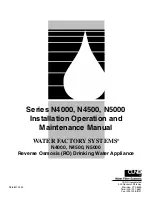
30
2.6
ELECTRICAL CONNECTIONS
DISCONNECT ELECTRICAL POWER TO THE RO UNIT PRIOR TO CONNECTING OR SERVICING TO THE RO
UNIT. FAILURE TO DO SO MAY RESULT IN SERIOUS INJURY OR DEATH TO PERSONS HANDLING THE UNIT.
Strictly observe all applicable electrical codes and regulations governing the installation and wiring of
electrical equipment. Typical codes specify the type and size of conduit, wire diameter and class of wire
insulation depending upon the amperage and environment. The power supply should always be of a
greater service rating than the requirements of the RO unit. Never connect the RO unit to a line that
services another electrical device, the RO unit should have its own breaker.
THE RO SYSTEM SHOULD HAVE ITS OWN INDEPENDENT POWER SUPPLY.
Note
The power supply should always be of greater service rating than the requirements of the RO unit. This
will assure proper voltage even if power supply voltage is slightly less than required.
Note
110 VAC 60 hertz units need a three-wire supply, black, white, and green for hot, common, and ground,
respectively.
220 VAC 60 hertz units need a four-wire supply, black, blue, white, and green for hot, hot, neutral, and
ground respectively - bring a separate neutral from the generator if necessary.
230 VAC 50 hertz units need a three-wire supply, black, white, and green for hot, hot, and earth,
respectively. Connect power to the main terminal block in the electrical enclosure following the above
wire colors.
1.
Before connecting electrical power to the water maker. Select the circuit breaker size of at least
50% more than the operating amps shown on the serial number tag.
2.
Verify all power switches and power sources are in the OFF position.
3.
AC POWERED 110V/220V: Connect RO unit motor to vessel circuit breaker. Parker recommends
use of an amp fuse or circuit breaker.
2.7
PLUMBING CONNECTIONS
Caution:
Always allow slack in water lines. Allow the line to enter or leave from the fitting in a
straight manner for several inches to ensure proper connection, to relieve stress to the fitting and tube
or hose, and to allow ease of detachment and re-attachment during maintenance or repair. If water
lines are pulled tight (causing them to bend at the fitting), they will leak, take in air, fail prematurely,
and/or break the attached fitting.
Summary of Contents for AQUA DUO A455C-2800
Page 15: ...15 Figure 2 4 Piping and Instrumentation Diagram 2800 3600 GPD ...
Page 17: ...17 Figure 2 6 Piping and Instrumentation Diagram 4800 6200 GPD ...
Page 32: ...32 Figure 2 26 Hose Tube Connection Instructions Figure 2 27 Tubing Fitting Internals ...
Page 63: ...63 8 DRAWINGS DIAGRAMS ...
Page 64: ...64 1 P ID ...
Page 65: ...65 ...
Page 66: ...66 ...
Page 67: ...67 ...
Page 68: ...68 2 GA Drawing ...
Page 69: ...69 ...
Page 70: ...70 ...
Page 71: ...71 ...
Page 72: ...72 ...
Page 73: ...73 ...
Page 76: ...76 4 Wiring Diagrams ...
Page 77: ...77 ...
Page 78: ...78 ...
Page 79: ...79 ...
Page 80: ...80 ...
Page 81: ...81 ...
Page 82: ...82 ...
















































